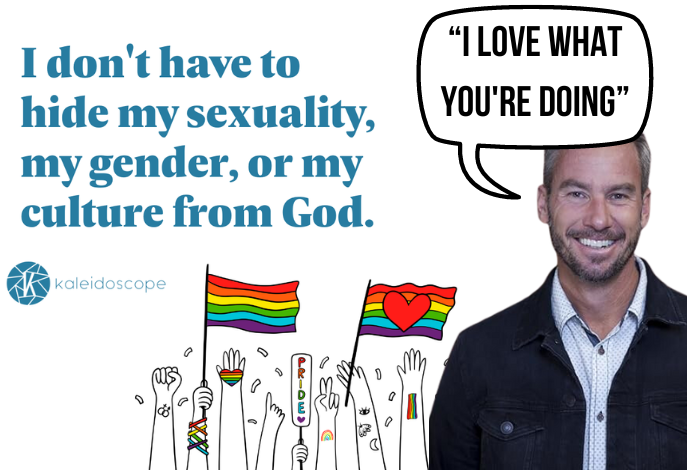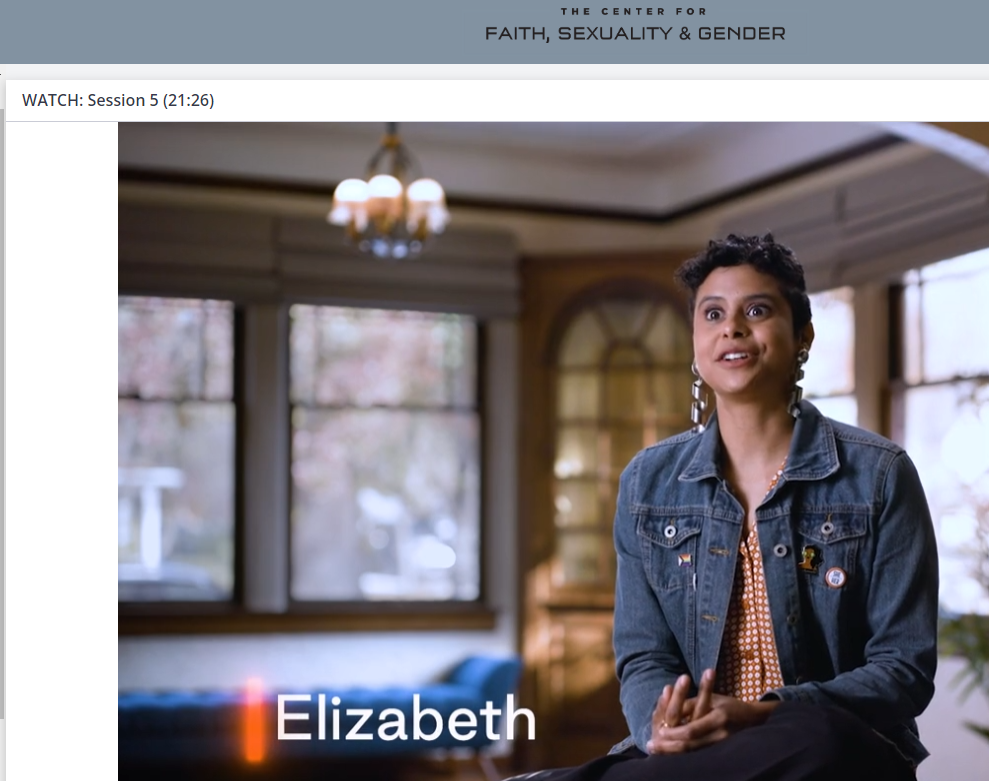Who is the Real Preston Sprinkle, Part 1: Does Preston Sprinkle Endorse Openly ‘LGBT’ Affirming Organizations?

For the related podcast, click here: https://youtu.be/Cl4Aie2oMyM
For part 2, click here
When is something an endorsement versus simply an unendorsed comment from a guest, or when is a guest simply a guest versus being implicitly endorsed? Following that theme, when is an organization responsible for clarifying a guest’s comment? I want you to honestly ponder those questions as we look at Preston Sprinkle and his ministry’s alleged endorsement of one highly compromised organization in particular. An organization that goes as far as to call God “queer” and “they.” My goal here is to present you with the information, and allow you to answer those questions for yourself. For reference sake, here is the relevant definition of “endorse” from Merriam-Webster:
- A: to approve openly
- especially : to express support or approval of publicly and definitely
- B: to recommend (something, such as a product or service) usually for financial compensation
I also want to clarify why I’m using “LGBT.” Preston and the organization we will look at use the term, but more than use it, they inject massive amounts of meaning into it. It is being used as a bit of a Trojan horse, but that will be covered in a later article. For now, it’s sufficient to know that I’m using it to engage with the added meaning injected into it, not because I think it is a useful or valid term. Hence, putting it in quotes.
The backstory
Preston Sprinkle and his ministries (from here on out, I’m just going to say ‘Preston,’ unless I’m exclusively referencing one of his ministries) have been facing criticism over their beliefs and approach to questions of sexuality. Amidst this criticism, we sought to dig deeper into the question of “who’s the real Preston Sprinkle.” This brought me to a webinar put on by Preston’s Center for Faith, Sexuality & Gender (the Center) entitled “Should Christians ‘Come Out’ about Same-Sex Attraction or Gender Dysphoria?” One of the organizations that a participant recommended caught my attention in particular. That organization is Kaleidoscope, a ministry that, as already stated, goes as far as to call God “they” in order for “gendered language” not to be a “stumbling block for folks.” Now, if it was simply a recommendation by a guest, that might raise an eyebrow, but the Center sent out a list of the recommended resources, with the Center’s logo, and no qualification.

Curious, I reached out to the webinar’s host, Greg Coles to get more information on why Kaleidoscope was seemingly endorsed. Greg was gracious enough to meet with me, and we continued to email back and forth. He didn’t want to speak for Preston or the Center, which left many of his answers a bit thin and disappointing, almost to the point of confusion. To be fair, he did warn me of that. He did offer one official statement about the Center’s stance on webinar guests and their recommendations.
The Center invites webinar guests to make their own recommendations in our webinars, but we tend not to make blanket endorsements of other organizations, in large part because there’s no way we can stay up to date on everyone’s events/materials and whether or not those things align with The Center’s approach. Even if an employee of The Center does recommend a book or organization, this doesn’t at all mean that The Center as an organization approves of everything in the content of that recommended book or organization. (And indeed, there have been occasions when webinar guests have recommended books or organizations we’ve never even heard of.) Resources recommended by webinar guests are what we send out with our post-webinar emails to attendees.
That statement is inadequate, though, and I fear it only creates more confusion, rather than clarity. For instance, why doesn’t the Center bother to do a few minutes of vetting before sending out an email that seems to endorse an organization? Greg makes it sound like vetting these organizations would take an impossibly long time, but I was able to uncover problematic details about Kaleidoscope by simply visiting their website. I do hope to have more conversations in the future, as there are many questions and details I’d love the chance to discuss. For now, I’m disappointed that an opportunity for clarity, even if it’s clarity I disagreed with, was lost.
I also wanted to make sure I had an honest grasp on what Kaleidoscope was, and what they believed. Even if the evidence seems clear, it is always worth verification to ensure one is not suffering from confirmation bias. With that goal in mind, I reached out to Kaleidoscope directly. Among other questions, I summed up what I saw as their stance on sexuality, in short saying they were “accepting of, and not requiring those actively pursuing same-sex relationship and transgender identities to stop pursuing such relationships/identities.”
It sounds like you have a good read on what Kaleidoscope is and does, which is encouraging! Our goal is to offer tangible expressions of Jesus to Queer people coming from different places. We mainly seek to serve Queer folks outside of the Church, and we believe the ‘sides’1 debate (though sometimes important) is often a massive distraction to loving people well and sharing the gospel with folks, which is our mission. We make room for ALL Queer people to explore faith in Jesus and empower LGBTQ+ people to discern, learn, and seek the Spirit in their sexuality and gender identity, trusting the Holy Spirit will guide them toward his will and way, not ours or on our time clock! We serve marginalized Queer folks in need and make space for seeking or interested Queer folks to discover Jesus.
We will double back to look more at Kaleidoscope, as well as look at their handling of “sharing the gospel with folks,” but for now let’s answer some basic questions about the situation.
“What if Preston and the Center Don’t Know Much About Kaleidoscope?”
That is a reasonable question, and one I initially assumed was true, which is why I provided some evidence to Greg. He did not directly answer the question, but did recommend I watch a podcast Preston did with Kaleidoscope president Elizabeth Black. We’ll look at clips from that podcast, but let’s establish something: how well is the Preston connected to Kaleidoscope? Obviously, we can’t know in exact details, but there are enough points of crossover to establish that they are not strangers. Examples found include Greg hosting a webinar for Kaleidoscope in 2021, members of both groups speaking at Revoice 21, Elizabeth was part of a webinar for the Center on October 2, 23, Preston interviewing Elizabeth, Elizabeth contributing to the Center’s “Journeys of Faith” course, and Elizabeth mentioning talking, seemingly casually, with Greg. To say that Preston or the Center are unaware of what Kaleidoscope is would be a lie.


“But that Doesn’t Mean They’re Endorsing Kaleidoscope, or that the Details are Known”
This is the heart of this article, asking when something becomes an endorsement. Since Preston’s interview with Elizabeth Black was recommended to me, let us use that as our central focus. Though Preston never says the words “I endorse Kaleidoscope,” he affirmed Elizabeth and/or Kaleidoscope, directly, three times in the interview. He said that Elizabeth “absolutely killed it” with her Revoice talk, “I love… what you’re doing,” and “I’m really excited about what you guys are doing, seriously.” Back to the definition of “endorse,” I’d argue Preston’s words fit into “to approve openly, to express support or approval of publicly and definitely.” Now, does this constitute a true and full recommendation of Kaleidoscope, or a more limited and passive support for his guest and her work? I’ll let you draw the line where and how you will, but keep reading so your decision can be well-informed.
What is Kaleidoscope, and is it Actually That Bad?
Kaleidoscope is a ministry based in New York City with the mission of “providing LGBTQ+ people opportunities to engage with tangible expressions of Christ.” They accomplish this mission by, for example, running mentoring groups, such as their “aspiring allies” group that helps you become a “Christian ally” to the “LGBTQ+ community.” They do outreach—with a booth draped with pride flags—at NYC’s pride events. Additionally, they host a monthly “beers & queers” event, where they gather “LGBTQ+ Folks” at “a local Queer bar for drinks and conversation.” I struggle to find a justification for hosting an event at a gay bar, as that seems in every way unwise.

Yes, we bring light to darkness, but we don’t return people, monthly, to where their particular darkness is found. Granted, they did tweet out that since God’s Spirit is everywhere, gay clubs are temples, so they may have a different opinion on where darkness and light are found.

In her interview with Preston, Elizabeth Black said that they do “old school evangelism” on the streets and engage people with the gospel. Maybe there is a redeemable quality to Kaleidoscope? Let us look at what this “evangelism” looks like:
Additional clips from Kaleidoscope.usa on Instagram
Those added clips were from Kaleidoscope’s Instagram, and there was no evangelism and gospel. They simply affirmed people’s identities outside of Christ. It hurt to hear some of the responses, such as “I love spirituality and all that stuff, so awesome,” or “Thank you guys, this is so cute.” Those are not people moving towards salvation, but people who feel more justified in their sin. Kaleidoscope chose to highlight those interactions, which, presumably means they see those as high-quality interactions. Also, did they call God “queer” and a “they”?
Can We Call God a “They”?
I asked Kaleidoscope about using “they” to refer to God, and Elizabeth was kind enough to respond.

To your question about our zines. We are a highly contextualized ministry and missions organization, so we want to speak the language of our people and communicate truths about God that will resonate with our audience. That said, we believe that God is genderless (acknowledging that God primarily uses male pronouns in the Bible), and the genderless nature of God is relatable to Queer people believing that God can relate to and speak to their lives. We don’t want gendered language to be an unnecessary stumbling block for folks!
Elizabeth Black, Kaleidoscope
While it is true that God is triune, and that He is not a human—does not have a sex or gender outside of the physical body of Jesus specifically—He chose to reveal Himself using masculine pronouns. It is astonishing Kaleidoscope would admit that, yet actively choose to use “they” for Him in order to be relevant. Kaleidoscope uses people’s “preferred pronouns” and staff will “offer their pronouns in introductory remarks,” yet won’t even use the pronouns God uses for Himself. This, functionally, places God’s identity lower than human’s. Sacrificing what the Bible says, in favor of appealing to the world seems to be a trend with Kaleidoscope, though.
Undermining The Person and Word of God
In a Christianity Today article, Elizabeth is quoted as saying:
“Jesus himself interacted within a cultural framework. I’m sure there were things that he didn’t agree with. However, he made himself a part of the community for the sake of his message”
Christianity Today “Should I Offer My Pronouns”

To reword what was said, she stated that Jesus did sinful things—since if God disagrees with something, that thing is by nature sin—to get His message across. That may seem to be harsh wording, but it is the consequence of what was said. It also fits with her previous statement to me, where she was willing to sacrifice the way God revealed Himself, in order to advance God’s message, at least in her mind.
This, however, isn’t the only time Elizabeth attacks God’s ability to communicate, as we return to her interview with Preston where she attacks the authority and sufficiency of God’s word:
Elizabeth asserts that since “Paul had a very distinct setness or calling,” was “writing in a particular context “talking in the context that he was,” and homosexual behaviors were different back then; that “the way and the nature [of] the conversation can be [different] today.” Paul and his writings can be defended, but the bigger issue is that Paul’s not recording his opinions, but God’s holy scripture. The commands given are God’s message for all people. Paul may not have known what 2024 would be like, but God knew.
Elizabeth also asserts that it is wrong to say “unless you follow this particular sexual ethic, you can’t be part of this community” because she doesn’t “think that’s how Jesus operated.” She admits that “there are things within the gospel, where we see, you know, the sheep and the wolves being separated,” but limits those to issues of “salvation and justice.” The justification provided is the story of the woman at the well. She describes Jesus as “not calling her out on her sin” but rather “inviting her to share her story.” Jesus never invited her to tell her story, but in her words, “Come, see a Man who told me all things that I ever did,” it’s clear that He was telling her story.
She further asserts that Jesus offers living water (salvation) without the “caveat that you have to leave all those men.” Aka: without repentance. This contradicts Jesus’ own description of His message: “Repent, for the kingdom of heaven is at hand.” Now, Elizabeth does say that “obviously God [didn’t want her] to live this life of sin and selfishness,” but this is more of a problem than a help for her. Who is Jesus? He is God. She admits that it’s contrary to God’s will that people continue in sin, which would make God a liar to hide that from the woman.
Preston, upon hearing this, jumps in with “woooooooooooo, preach it girl!” Again, make of this what you will, but it seems to continue a approving, or endorsing, trend. Preston takes the story further, saying she was a “victim of a patriarchal… culture” and that “she was abused.” No longer a sinner in need of saving, Preston makes her a victim in need of liberation. This would make Jesus cruel though, as he offers her living water—salvation from her sins—instead of liberation from her supposed patriarchal oppressors.
Affirming, Biblical, or Unclear?
On a podcast Elizabeth cohosts—“Life on Side B,” another resource recommended in the “coming out” webinar—she states that, “as queer people, we have been robbed of intimacy… being told, historically, that you can’t get married in same-sex partnerships. That is another way of robbing of intimacy.” By what standard does not allowing un-Biblical marriage, which is something she is supposedly against as someone with a “Biblical sexual ethic,” rob people of intimacy? It certainly isn’t God’s standard that you could get that from, as all good, Biblical forms of intimacy are open to all people as long as they surrender their desires to Christ. What really muddies the waters, though, is Elizabeth’s usage of the pronoun “we.” She includes herself as part of this group of people that Christians have robbed of intimacy (listen for yourself in the clip below). Many questions can be raised from her statement, but for now, I simply want to point out how unclear it makes her view marriage and sexuality.
You may have caught it in the video highlighting Kaleidoscope’s “evangelism,” but in response to a question on Facebook asking if they’re non-affirming (ignore the part about celibacy) they respond that would be “false.” Aka: they are affirming.

Some information does contradict the organization being affirming, or so it may seem. It comes down to what terms like “affirming” and “ally” mean. Is Kaleidoscope “affirming” in the sense that they see homosexuality as a good and acceptable thing, something to be acted upon? I don’t feel that would be a completely fair description.

opened the way for sinners to be justified and glorified.
However, they certainly are affirming in the sense that they “make space” for all people, and don’t want questions of sexuality to be a “stumbling block” to the gospel. What does that mean in practice? It means affirming people in their sin, even going as far as to compromise on one’s own stated beliefs—such as calling God “they”—in the hopes that their audience will “discover Jesus.” But the authentic Jesus is not found in sin or falsities. Sure, we all come to Him as sinners, but He’s calling us out of sin. People cannot get saved from what they don’t know they need saving from, and the difference between an attitude of “gay is okay” and “we want you to come to Christ, so we won’t tell you it’s not okay” is nonexistent for the person being “evangelized.” All they’ll hear is: “Jesus loves me for who I am, so I don’t need to change.”
Is this simply my speculation, a fitting together of information taken out of context? Remember, I reached out to Kaleidoscope, asking directly about their position, and I was told that my characterization of the ministry was a “good read on what Kaleidoscope is and does.”
Wrapping Things Up
“Is Preston endorsing organizations that openly defy how he characterizes himself and his ministry” may be an easy question to form an answer on, and that answer will likely be colored heavily by your prior opinion about Preston. I feel it is important though, to be able to see more clearly how Preston operates, both him and his ministry, and to really dive in and have a solid footing for why you may answer one way or another. For me personally, I started this assuming that Preston and the Center did not know what Kaleidoscope was, yet in the end, the evidence led me to believe they knew. More than just knowing about Kaleidoscope, Preston/the Center even agreed with and applaud Kaleidoscope. The one dissatisfying thing to me is not being able to talk with Preston directly. I don’t see a way that could change things, but it would be useful for bringing the situation into sharper clarity. I reached out with a draft of this article months before posting it, and no response was given.
What caught me off guard, even as someone critical of Preston, is how much he agreed with Elizabeth, or even took her point and went further. Take this final clip for example, where Preston agrees that holding off on teaching the Biblical truth on marriage and sexuality is the right thing to do, since people need to have a “deconstructed and reconstructed view of who Jesus actually is.” That seems fine on the surface, since knowing who Jesus is, is absolutely critical for the Gospel to be true. Yet, understanding who Jesus is and what He did, also involves knowing how we approach Him and what sin is. “You are a sinner in need of repentance” is not incidental. Kaleidoscope and Preston have at best presented a bait-and-switch gospel where you don’t tell people about the Bible’s stance on a pet sin until after salvation. That doesn’t seem like an honest strategy that will produce genuine results. How can someone repent and believe if they don’t know what to repent of?
More than that, Preston links the perceived abuses brought upon the “LGBT” community by the church, to the near-analogy of a German missionary going to Israel in the 50’s. The logic here is that we must hide part of God’s word, because of a history of a people group mistreating another group. What that seems to say about Biblical truth, is that we should withhold it because people in certain contexts will see it as offensive. Again, what does that say about the genuineness of someone’s salvation, if they see part of God’s word as offensive?
This all paints a picture of a view that seems a be a lot closer to Kaleidoscope than to Biblical truth. This makes Preston’s podcast with pastor Jared Moore, where he rebuffed many claims that he held unorthodox views, all the more questionable, and I’d even say dishonest. I talked about that podcast after it was released if you’d like to hear my thoughts on it. I think that’s enough diving into Preston’s beliefs, though, and we we cover those more in another part of this series.
For now, I’ll leave you how we began: When is something an endorsement versus simply an unendorsed comment from a guest, or when is a guest appearance simply a neutral conversation versus an endorsement of that guest? Following that same theme, when is an organization responsible for offering clarification for a guest’s comment? You have the information to make an informed conclusion, and it’s up to you to decide.
A Question for Preston
How do you explain this situation?
For part 2, click here
- ‘Sides’ refers to “side A” and “side B” Christians, or those actively living a homosexual/transgender lifestyle vs. those identifying as homosexual/transgender, yet not pursuing same-sex relationships or embracing a different gender identity ↩︎




